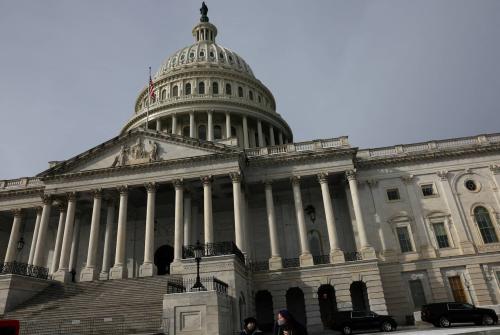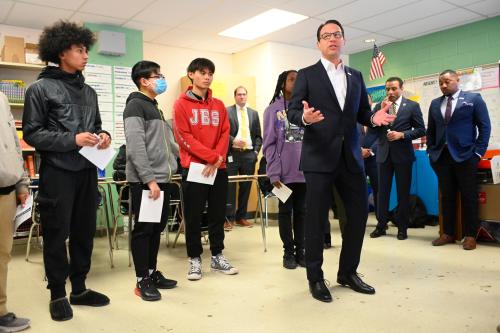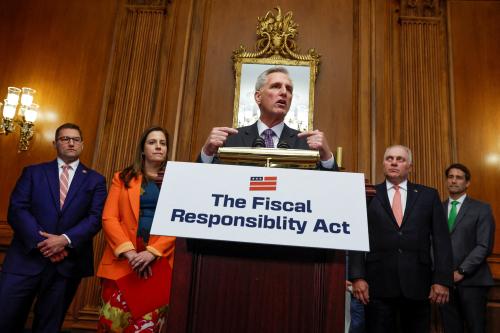A major reason that many conservative analysts endorsed Mitt Romney’s selection of Paul Ryan as the vice presidential candidate is that they believe that Ryan is the only man with a plan for attacking the federal deficit. They argue that Ryan is one of the few members of congress who truly understands the federal budget and that he has made innovative if controversial proposals to stem the tide of red ink. Further, they claim that Ryan has shown his skills in explaining and defending his budget both in sessions with other Republicans and in confrontations with Democrats, especially those who came to campaign events specifically to trash his budget.
The long-standing conservative critique of the federal government is that it is too big, but this critique has taken on increased urgency in recent years. Although Republicans led campaigns to cut federal spending under Reagan in the 1980s and under the Gingrich-led congress in the mid-1990s, neither set of reforms resulted in permanent reductions in the size or functions of the federal budget. Like kudzu, federal spending just keeps on growing.
Now Republican small-government philosophy is meeting budget necessity, giving Republicans another chance to reduce the size and scope of the federal government. Nearly all Americans, including elected officials, realize that the federal government is going bankrupt and that spending must be cut as part of any reasonable deficit solution. Thus, it is unlikely that there will ever be a better opportunity to reduce the federal role in American life than the present combination of Republican desire and budget necessity. In this context, Paul Ryan does appear to be a man for the times. But even if the Romney/Ryan ticket wins the 2012 election, major compromises with Democrats must be forged to achieve a breakthrough on the deficit. I give the Romney/Ryan team great credit for putting the budget issue front and center in the campaign and for proposing the necessary components of a budget deal. But major questions remain that will have to be answered after the election if the nation is to achieve a significant reduction in the federal deficit on a bipartisan basis. Three are especially important.
The first is tax reform. So far, serious progress on the deficit has been greatly hampered by the Republican refusal to increase taxes and the Democratic refusal to slow the growth of entitlements, especially Medicare. Any bipartisan budget will necessarily involve tax increases and entitlement cuts. Although tax increases are enormously controversial, voters might never suspect from the rhetoric that the basic structure of tax reform already has widespread bipartisan support. The U.S. tax code is riddled with credits, deductions, and other special considerations that together deprive the federal government of at least $1 trillion in revenue each year. Modifying or ending some of these tax breaks would allow congress to lower tax rates and still produce additional revenue. Both parties say they are for eliminating tax breaks but the parties differ over whether the reforms should produce more tax revenues.
The second compromise needed for a deficit bargain is on Medicare. There is universal recognition that Medicare is the major cause of the nation’s growing long-term deficit on the spending side. CBO estimates that under the most likely baseline scenario, spending on Medicare will double as a percentage of GDP between now and 2050. The Ryan plan would reduce this projected spending on Medicare by nearly two percentage points of GDP. In today’s dollars, two percent of GDP would be around $300 billion; in 2050 it would be far more. Ryan thinks that the nation can achieve this level of budget savings by subjecting Medicare to market forces rather than government simply providing more and more money. Many health and budget experts disagree, but give Ryan points for at least attacking the problem with a proposal that may address the problem by bringing market forces to bear on Medicare.
Third, most of the rest of the budget except defense will sustain huge cuts unlike anything achieved in the past. Many of these cuts will fall on programs for low-income families, including Medicaid and SNAP (food stamps). The entitlement nature of these programs would probably be ended and states would be given a capped block grant with fixed dollar levels. States would then be expected to figure out how to best use the money, including who would get what level of benefits. These are huge changes that would reduce support for the poor and near-poor and would be strongly opposed by most Democrats and many lobbying groups.
The Ryan budget certainly meets the test of reducing the size of the federal government and, given his Medicare proposal, his budget also changes the structure of the second biggest federal program. If regarded as an opening bid by the Republican Party, the Ryan budget may not be as harsh as it seems. Compromise to achieve bipartisan legislation is inevitable. In any case, elections do not always produce peace and harmony between opposing parties. The conflict produced by the highly negative election now taking place will make the needed compromises on taxes, Medicare, and other spending all the more difficult. Anyone who knows about and reflects on the federal deficit realizes that dramatic reductions in spending lie ahead. The cuts will almost certainly not be as deep as those proposed by Ryan because tax increases, avoided completely in the Ryan budget, will reduce the level of spending cuts needed to achieve any given level of deficit reduction. Even so, lots of sacrifices will be required after the election to make serious progress on the deficit. If the current generation of adults refuses to make these sacrifices, our children and grandchildren will be forced to make them.



Commentary
Op-edCan a VP Ryan Boost the Odds of a Deficit Compromise?
August 28, 2012